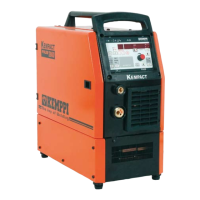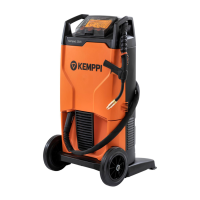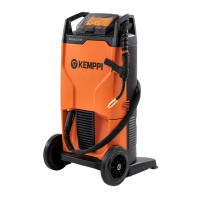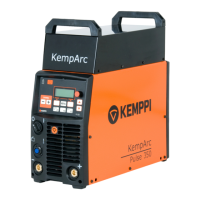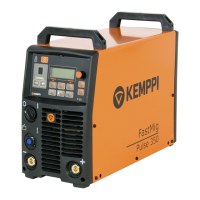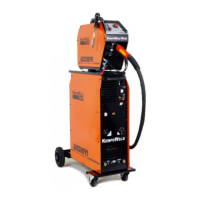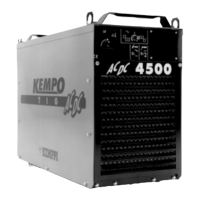4 – Kempact pulse 3000, Kempactcool 10 / 0813 © Kemppi oy
Spatter and re safety
• Welding is always classied as hot work, so pay attention to re safety regulations during
welding and after it.
• Remember that re can break out from sparks even several hours after the welding work is
completed.
• Protect the environment from welding splatter. Remove ammable materials, such as
ammable uids, from the welding vicinity and supply the welding site with adequate re
ghting equipment.
• In special welding jobs, be prepared for hazards such as re or explosion when welding
container type work pieces.
• Never direct the spark spray or cutting spray of a grinder toward the welding machine or
ammable materials.
• Beware of hot objects or splatter falling on the machine when working above the
machine.
• Welding in ammable or explosive sites is absolutely forbidden.
General electric safety
• Only connect the welding machine to an earthed electric network.
• Note the recommended mains fuse size.
• Do not take the welding machine inside a container, vehicle or similar work piece.
• Do not place the welding machine on a wet surface and do not work on a wet surface.
• Do not allow the mains cable to be directly exposed to water.
• Ensure cables or welding torches are not squashed by heavy objects and that they are not
exposed to sharp edges or a hot work piece.
• Make sure that faulty and damaged welding torches are changed immediately as they can
be lethal and may cause electrocution or re.
• Remember that the cable, plugs and other electric devices may be installed or replaced only
by an electrical contractor or engineer authorised to perform such operations.
• Turn off the welding machine when it is not in use.
Welding power circuit
• Insulate yourself from the welding circuit by using dry and undamaged protective
clothing.
• Never touch the work piece and welding rod, welding wire, welding electrode or contact tip
at the same time.
• Do not put the welding torch or ground cable on the welding machine or other electric
equipment.
Welding fumes
• Ensure proper ventilation and avoid inhaling the fumes.
• Ensure sufcient supply of fresh air, particularly in closed spaces. You can also ensure the
supply of clean and sufcient breathing air by using a fresh-air mask.
• Take extra precautions when working on metals or surface-treated materials containing lead,
cadmium, zinc, mercury or beryllium.

